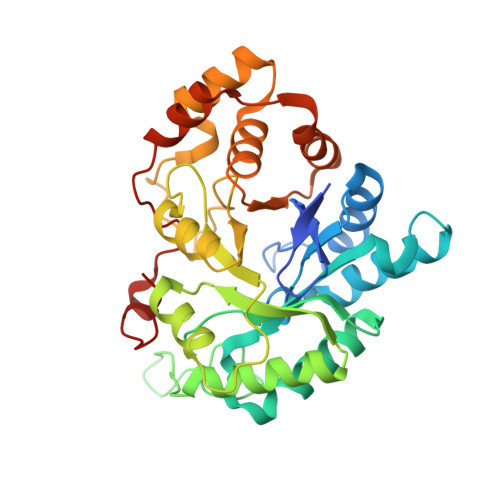Development of highly potent and specific AKR1C3 inhibitors to restore the chemosensitivity of drug-resistant breast cancer.
Liu, Y., Chen, Y., Jiang, J., Chu, X., Guo, Q., Zhao, L., Feng, F., Liu, W., Zhang, X., He, S., Yang, P., Fang, P., Sun, H.(2022) Eur J Med Chem 247: 115013-115013
- PubMed: 36566714
- DOI: https://doi.org/10.1016/j.ejmech.2022.115013
- Primary Citation of Related Structures:
7WQM, 7WQR, 7WQS - PubMed Abstract:
Aldo-keto reductase 1C3 (AKR1C3) is overexpressed in multiple hormone related cancers, such as breast and prostate cancer, and is correlated with tumor development and aggressiveness. As a phase I biotransformation enzyme, AKR1C3 catalyzes the metabolic processes that lead to resistance to anthracyclines, the "gold standard" for breast cancer treatment. Novel approaches to restore the chemotherapy sensitivity of breast cancer are urgently required. Herein, we developed a new class of AKR1C3 inhibitors that demonstrated potent inhibitory activity and exquisite selectivity for closely related isoforms. The best derivative 27 (S19-1035) exhibits an IC 50 value of 3.04 nM for AKR1C3 and >3289-fold selectivity over other isoforms. We determined the co-crystal structures of AKR1C3 with three of the inhibitors, providing a solid foundation for further structure-based drug optimization. Co-administration of these AKR1C3 inhibitors significantly reversed the doxorubicin (DOX) resistance in a resistant breast cancer cell line. Therefore, the novel AKR1C3 specific inhibitors developed in this work may serve as effective adjuvants to overcome DOX resistance in breast cancer treatment.
- School of Pharmacy, China Pharmaceutical University, Nanjing, 211198, People's Republic of China; Academy for Advance Interdisciplinary Studies, Peking University, Beijing, 100871, People's Republic of China.
Organizational Affiliation:


















